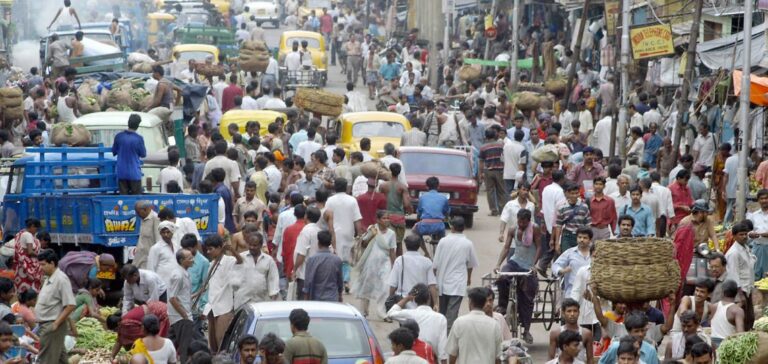India, a country of 1.4 billion people, is expected to experience an urban population explosion in the coming decades with already overcrowded megacities lacking essential infrastructure, where living conditions are likely to deteriorate further due to climate change.
The population of Bombay, one of India’s largest cities, has grown by 8 million in the last 30 years, the equivalent of New York City.
The megacity is now home to 20 million people and is expected to grow by seven million by 2035.
Like other Indian megacities, the housing stock, road and transportation networks, water supply and waste management have not been sufficiently developed to meet the real needs.
Thus, about 40% of the population lives in slums. Overcrowded, made up of makeshift shacks, these areas of misery are for the most part deprived of running water, electricity and sanitation, which the richest districts of India enjoy and which, in some places, adjoin them.
Commuters spend several hours in transport to get to work in Mumbai. Clinging to the doors of crowded trains, on board full buses, cars or motorcycles for the more affluent, traffic is a constant ordeal on bad and congested roads.
An anthill
Mohammed Sartaj Khan, originally from a village in the northern state of Uttar Pradesh, arrived in Bombay at the age of 16 or 17 and settled in the largest slum, Dharavi, filmed in “Slumdog Millionaire”, where one million people are crammed together.
“When I came here, people felt like ants (…) like in an ant farm, no one cares about each other,” he remarks.
He remembers a “wonderful childhood spent in the village” where “there is a peaceful atmosphere, the opposite of the chaos here”. And to add: “the population has no money”.
Now 35 years old, he still lives in Dharavi and works in a tannery.
At the beginning, he earned 6,000 rupees (70 euros) per month, but today, as a technician, his salary is four times higher.
He sends most of it to his wife and children who live in the village, regretting that he returns there so rarely, for lack of means.
Untreated wastewater
The world’s population will reach eight billion this month.
The UN predicts that India’s population will rise to 1.7 billion by the 2060s, before falling to 1.5 billion by 2100.
The number of city dwellers will increase by 270 million by 2040, but more than half of Indians will still live in rural areas, according to the International Energy Agency.
Urban development will increase the production of electricity, steel and construction materials, resulting in more carbon emissions.
According to a 2021 Indian government report, about 70% of the billions of liters of wastewater produced each day in cities are not treated.
Bangalore, which has some of the worst traffic congestion in India, suffered severe flooding in September, blamed on the development of buildings in the technology hub without a city plan.
Many cities are experiencing flooding, including Madras which was also hit by drought in the summer of 2019.
This kind of crisis is attributed to insufficient rainfall and urban expansion on wetlands of the ecosystem.
“When growth is not planned, many cities experience flooding,” Professor Sayeed Unisa of the International Institute of Population Sciences in Mumbai tells AFP.
Urgent planning
Millions of urban Indians do not have access to running water and depend on truck or train deliveries.
Everywhere, including Delhi, people are drilling wells, deeper and deeper, as the water table drops.
According to scientists, global warming is likely to make cyclones more intense and frequent, monsoons more irregular and powerful, and cause more droughts.
Bombay and Calcutta are particularly exposed, and also threatened by rising sea levels.
Indian summers are becoming increasingly hot, especially in the heat-trapping concrete urban areas. This year, India had the hottest month of March.
Urban overcrowding increases the risk of large-scale spread of viruses such as Covid.
According to Poonam Muttreja of the Population Foundation of India, India needs to invest in the rural economy to stem the exodus to the cities and encourage people to move to smaller urban centers.
“The poor, especially migrants, in large cities are the most vulnerable” to natural disasters, Muttreja said. “India needs to make a paradigm shift. And instead of complaining, we need to start acting. It is not yet too late to start planning.






















